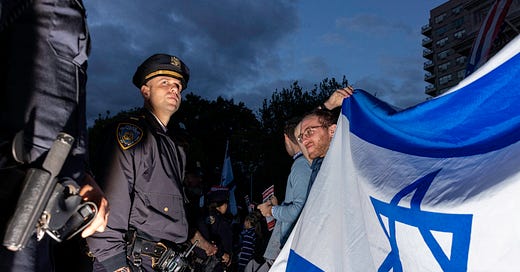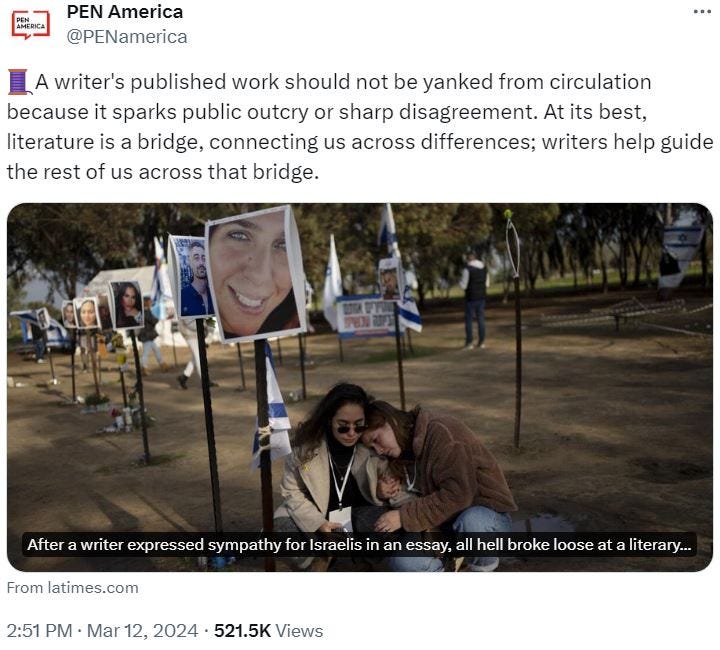Banned at ‘Guernica’
The progressive literary magazine sees a staff revolt and retracts an essay on empathy and complexity in Israel/Gaza.

IT’S THE KIND OF CONTROVERSY that could only happen in the progressive intelligentsia: a row about a literary journal’s retraction of a liberal, Jewish, Israeli writer’s essay on her moral and emotional struggle after the October 7th Hamas attacks and during the war in Gaza.
The essay, “From the Edges of a Broken World” by Joanna Chen, appeared on March 4 in the prestigious twenty-year-old online journal Guernica. Its publication was met with a social-media storm in which more than a dozen of the magazine’s volunteer staffers resigned—including Guernica co-publisher Madhuri Sastry—and several writers withdrew their submissions. In response, the magazine’s editors removed the essay from the site with an expression of regret for its publication and a brief promise, as yet unmet, that an explanation would be forthcoming:
The scandal has continued to ricochet and reverberate. This week, the free-expression group PEN America tweeted out a critique of Guernica for taking down Chen’s article:
And then the PEN statement itself provoked a backlash.
Wrapped up in the controversy are several issues that elicit intense emotions: the anti-Israel animus on the left; antisemitism in a discourse that presumptively turns Israeli Jews into pariahs; genuine horror about the bloodshed and immiseration in Gaza, with no end in sight; and the perennial debate about “cancel culture.” Darkening the debate is the shadow of left-wing illiberalism at a time when the right-wing variety looks especially menacing.
THE ESSAY THAT IGNITED the firestorm, still available in the Internet Archive, has received high praise for its searing sense of humanity, vulnerability, and empathy. Chen, a British-born writer and translator, could not be a more model Israeli progressive: She refused to serve in the Israeli Defense Forces after her family brought her to Israel as a teenager, and for the past few years she has been a volunteer for Road to Recovery, a nongovernmental organization that drives children from Palestinian territories to Israeli hospitals for treatment. As writer and social critic Phoebe Maltz Bovy has noted in Canadian Jewish News,
Chen isn’t writing in some vague sense about ‘the Palestinians’ but about actual Palestinians with whom she either has or did have relationships. She also voices frustrations with fellow Israeli progressives. She is frustrated, to be clear, from their left.
In the essay, Chen expresses her horror at the October 7th attacks in which another Road to Recovery volunteer, Canadian peace activist Vivian Silver, was killed by Hamas; about her decision to stop and then, two weeks later, resume her volunteer work; and about trying to keep lines of communication open with both Palestinian and Jewish Israeli friends. She pointedly disagrees with a fellow volunteer upset that the Palestinians she knew through her work didn’t reach out after October 7th (they were, Chen feels, “struggling with their own problems”). She writes about her fear that some of her Palestinian acquaintances may not be alive. She also acknowledges that they could be in danger from Hamas as well as the Israeli military. For this, she has been accused of having “poeticized genocide.”
As is often the case with online mobs, Chen’s bashers have sometimes decontextualized her words to the point of distortion. One particular source of outrage has been this passage:
A neighbor told me she was trying to calm her children, who were frightened by the sound of warplanes flying over the house day and night. I tell them these are good booms. She grimaced, and I understood the subtext, that the Israeli army was bombing Gaza.
One of the Guernica editors who quit, Hua Xi, cited the “good booms” line as “particularly harmful and disorienting” without mentioning the context at all. Some social media users complained about the “lack of absolute disavowal and condemnation.” Yet the entire point of the passage is that the neighbor is saying something awful—and even realizes it herself, since she is described as grimacing at her own words.
Another editor who resigned, April Zhu, claims that Chen treats occupation, “apartheid,” and “genocide” as “immutable parameters within which we negotiate each other’s shared humanity.” Yet there is nothing in the essay to indicate that Chen considers the status quo “immutable” or change impossible.
But the likelihood is that no reading of Chen’s narrative would have appeased her detractors. Bovy asks if they could accept any commentary from an Israeli Jew short of renouncing one’s (and Israel’s) existence—and the answer seems to be a clear no.
To Bovy and many others, this makes the attacks on Chen, and the Guernica retraction, essentially antisemitic. That point is certainly debatable with regard to intent. Those infuriated by Chen’s essay would have likely had the same objections to an essay that extended nuance and empathy to a man accused of rape or abuse toward women, or to a white author who tried to explore the nuances and complexities of racial identity and didn’t “stay in her lane.” Indeed, the Twitter account of Writers Against the War on Gaza, a loud voice in the crusade against “Guernica’s zionism,” has also accused Chen of undisguised “white supremacy”—because she once wrote a thoughtful essay for Haaretz saying that she could “sort of” relate to faux black woman Rachel Dolezal as a Jew who had struggled with her Jewish identity, had tried to reinvent herself as a Christian, and still attended church.
The key analytical factor for Chen’s critics is oppressor/oppressed. And, of course, in today’s progressive framework there’s no question about which is which in the Israeli/Palestinian conflict. The responses to Chen’s essay and to its defenders, such as PEN America, leave no doubt that in the milieu from which those responses come, the only acceptable way to see Israel is as a “violent, imperialist, colonial power” and as a “settler-colonial, apartheid, and . . . genocidal regime.” Tweets from Writers Against the War on Gaza (a group whose signatories include Cornel West, Judith Butler, film producer Lilly Wachowski, Pulitzer Prize–winning critic Andrea Long Chu, and Game of Thrones author George R.R. Martin) put “Israel” in quotation marks and deride the idea that “zionism could be solved through empathy, literature, and charity.” In other words, the existence of a Jewish state is a problem that requires a solution.
In the end, regardless of intent, it’s hard to dispute that the Guernica litmus test is antisemitic in its effect, since it would deplatform all but a minuscule proportion of the world’s Jewish population.
THE GUERNICA FLAP also points to other toxic patterns—from the purposeful rejection of empathy (as Phil Klay argues in the Atlantic) to militant illiberalism. Indeed, to the progressive mob, “liberal” is as much of a damning epithet as it is to the Trumpists.
Of course, Guernica’s apologetic withdrawal of the essay exemplifies illiberalism—and it’s only the latest in a trail of retractions (or demands for retraction), apologies, and resignations in the name of progressivism. (Just a few examples from the last decade: the defenestration of New York Review of Books editor Ian Buruma in 2018 after publishing Canadian broadcaster Jian Ghomeshi’s article piece about being accused, and acquitted, of sexual assault; the blowup over philosophy professor Rebecca Tuvel’s 2017 article in the feminist philosophy journal Hypatia about parallels between transgender and “transracial” identities, which involved resignations, apologies, and calls for removal; the Nation’s 2018 apology for publishing a poem by a white author writing in the voice of a homeless black woman; the sci-fi magazine Clarkesworld’s 2020 removal with apologies of a transgender author’s story which offended some activists by parodying an anti-trans meme about people identifying as “an attack helicopter.”)
In some cases, including that of Chen’s essay, the “Streisand Effect” results in more publicity and a larger audience for the thing that was supposed to be hidden. But the attempt at suppression isn’t any less suppressive because it backfires—whether it’s a book removed from a school library under pressure from Moms for Liberty or an article removed from an online magazine under pressure from Writers Against the War on Gaza.
The same illiberalism has manifested itself in the torrents of abuse hurled at PEN America for daring to suggest that “published work should not be yanked from circulation because it sparks public outcry or sharp disagreement.” The organization was accused of “supporting Mein Kampf” and “apologizing for genocide apologists.” It was also repeatedly accused of failing to speak up for pro-Palestinian writers who had books and cultural events canceled—even though it did speak up against such cancellations two weeks after the October 7th attacks.
The left-wing intolerance on display in this ugly episode does not have the power of government behind it and may not look particularly scary next to the prospect of Donald Trump’s return to the White House. Nonetheless, its toxicity should not be underestimated. It contributes to the overall cultural climate of hate. It lends more plausibility to the right’s claim that it needs to use the power of government to advance its cultural agenda because there’s no other way to counteract the power of the left.
Let’s put it this way. A left that sees “From the Edges of a Broken World” as a “harmful” piece of writing that needs to be canceled isn’t terribly different from what it claims to oppose.








